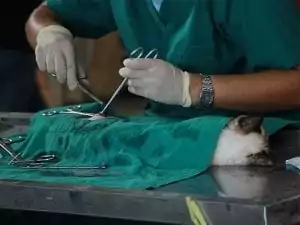The article is a written by Andreia Dias. Find out more about Andreia and her project UK VetMove in the interview.
Practicing veterinary medicine within “Her Majesty’s” territory is often pursued by veterinarians of many different backgrounds and countries. But what’s it like being a vet in the United Kingdom? What opportunities are there? And what’s expected of you?
What roles to expect after studying Veterinary Medicine in the United Kingdom
The majority of veterinarians in the United Kingdom work within clinical practice, and particularly small animal clinical practice. Of course, there are many other roles available. Public health roles, meat inspection and similar are often taken by overseas vets, as the majority of UK graduates has a much heavier focus in clinical practice. However, there are other roles available, particularly with pharmaceutical companies as sales representatives, or advisory roles for these companies and laboratories. Working in education is also possible and, of course, within clinical practice, there’s a wide range of roles to choose from, from general practitioner to referral specialist.
About your colleagues
The United Kingdom is home to a lot of overseas vets due to its close proximity with European countries and the ease of learning English as a language, which is commonly the second language of many overseas vets. In many cases, though, the overseas vets also speak English as a first language as many travel from the USA, South Africa and Australia to work in the United Kingdom.
The veterinary team is reinforced by receptionist staff, as well as veterinary nurses, who are also licensed and can perform several procedures such as drawing blood and administering medication (and even some surgical procedures). Other personnel you may work with are animal care assistants, which help managing the kennels, as well as practice managers who may have a management background (but not necessarily a veterinary background).
Workplace – who owns who?
In the United Kingdom, there is increasing corporatization of veterinary care facilities. While there are several practices that are still independent, in 2018 the figures indicated that 35% of veterinary practices were owned by corporate companies in the United Kingdom. The major companies are Independent Vetcare, CVS, Medivet, Vets4Pets, VetPartners and Linnaeus, which is set to be bought by Mars Petcare (2018).
Type of work
Most vets will be working in clinical practice. But even in clinical practice, there are different options available. Practices may work with small animals, equine, farm or a mix of all of them. Most places will be performing first opinion appointments, however, there is an advanced level of training and general practices may have veterinary surgeons that have done certificates in specific areas and, therefore, offer more specialized services, such as Cardiology and Ophthalmology. It is also possible to find referral practices easily, which only accept patients referred to by their primary care clinician. It is common for veterinary surgeons to refer patients when they are struggling with a problem or when they feel the problem is too complex for their knowledge and facilities.
Provision of emergency services is mandatory according to the Code of Conduct, and therefore many practices run their own emergency service, while others outsource this. That means that it’s also possible to work exclusively for an emergency care provider.
Licensing
In order to practice as a veterinary surgeon in the United Kingdom, one must register with the Royal College of Veterinary Surgeons (RCVS), which regulates the profession. Some veterinary degrees are directly recognized by the RCVS and allow for a direct registration, while others require the candidate to sit and pass a test called the Statutory Membership Exam in order to be allowed in the Register.
Biggest challenges
Working in clinical practice in the United Kingdom comes with a set of challenges. A lot of these challenges are related to the high level of medicine practiced, which requires a very good knowledge from the vet, but also some pressure to get a diagnosis. On the other hand, client expectations are high and the existence of pet insurance promotes the pursuing of more testing and treatment options. The workload is intense, with many places running 10 or 15 minute-long consultations, which sometimes brings up challenges with work-life balance. However, the high standards of care and range of treatment options is also one of the reasons why practicing in the United Kingdom is often desired.
Are you interested in pursuing veterinary medicine as a profession, but still haven’t decided in which country? Read the article Veterinary Medicine in The USA on our blog, to help you make a decision!



